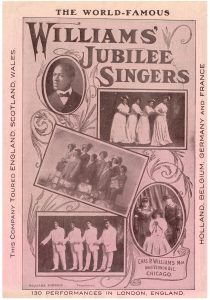In an article written for the Chicago Defender in 1954, Enoch Waters writes about Charles P. Williams and the choir he had founded fifty years prior in Chicago, reflecting on “the power of music” to break racial barriers.1 Waters mentions Williams’ “refreshing” and “jaunty” personality and the benefits of professional management as factors in their success in small towns across the country, many of which had never encountered a Black person before. However, Waters writes that Williams considered their music the “most effective weapon of the group in combating racial discrimination”, and although many towns received them with hostility initially, when they returned to these towns for another performance, they would “almost invariably” find a warm and hospitable welcome and sold-out crowds.
Williams’ ensemble was sometimes billed as Williams’ Jubilee Singers, and sometimes as Williams’ Colored Singers.2 The former label was a tribute to the original Fisk Jubilee Singers, who had paved the way for Black performers (later to include H.T. Burleigh, J. Rosamond and James Weldon Johnson, and others) to bring spirituals to the white American public.3 Williams’ group, founded in 1904, was not the first choir to take advantage of Fisk’s success, but they were one of the first to sing in a quartet, rather than a larger group of ten to twelve.4 The Fisk group had sought to elevate the spirituals and prove that Black music belonged in a high-class setting, resulting in the crystallization of the genre and transforming its norms of variance into ones of fixity. These were the issues that later led Zora Neale Hurston to react to the concert performances of Burleigh and others, proclaiming that “there has never been a presentation of genuine Negro spirituals to any audience anywhere”.6 Williams’ group, made up of classically trained and educated performers, evidently wished to fit into this tradition. They were internationally known, touring several European countries and performing 130 concerts in London alone.2 However, Waters notes that by 1932, “the radio, the depression, and the public’s change in music taste conspired to end a long brilliant career”. As tastes changed, so did the circumstances that had allowed Williams’ group to have an impact on small town America.
The Chicago Defender developed in much the same circumstances as Williams’ ensemble. It was founded just one year later in the same city, and its founder, Robert Abbott, was a former member of the Hampton Singers, one of the first Black university choirs to imitate Fisk.6 Abbott envisioned a newspaper that would become the “defender” of the Black community, and by the early 1920s it had become the most influential Black newspaper in America, protesting against Jim Crow laws and acts of violence while championing the growing civil rights movement. Its calls for black people to move out of the South were a primary cause of the Great Migration, and in many ways the advances made by the Defender led the way for the Black press in general, illustrating the paper’s enormous impact. While the Harlem Renaissance was seen by many as a victory only for the elite, the Defender sought to present Chicago as an ideal destination for ordinary Black people by featuring personal accounts as well as by highlighting local artists, entrepreneurs and others who had found success in Chicago.7
While this profile of Williams’ Jubilee Singers was written retrospectively to celebrate a group which had found success in the past rather than to highlight a rising star, the article serves many of the same purposes as earlier Defender articles. This article is part of a series entitled “Adventures in Race Relations”, portraying it as an ongoing struggle (which it very much was in 1954). Waters notes that Williams had originally come to Chicago for the 1893 Chicago World’s Fair before founding the Jubilee Singers (which was also Abbott’s impetus for founding the Defender), re-establishing Chicago as a place where ordinary people could find success. Waters celebrates the Jubilee Singers’ use of “the power of music” to break down racial barriers, paralleling the Defender‘s use of poetry, music and other forms of art to portray Chicago as a center of Black culture. Williams’ group sought to adhere to the performance practices set by Fisk and to contribute to the perception of spirituals as art music. However, Waters’ emphasis of their impact on whites in small towns across the country and the context of the Defender‘s commitment to showing the contributions of ordinary Black people to Black culture serve to cast Williams’ Jubilee Singers as an important part of the Black struggle for acceptance by the white public.
References:
1 Waters, Enoc P. “Adventures in RACE RELATIONS: THE POWER OF MUSIC.” The Chicago Defender (National Edition) (1921-1967), Oct 23, 1954. https://www.proquest.com/historical-newspapers/adventures-race-relations/docview/492959620/se-2.
2 The World Famous Williams’ Colored Singers. Chicago: Press of Rosenow Co., [ca. 1925]. Accessed online via RareAmericana.com, November 14, 2022. https://www.rareamericana.com/pages/books/3727978/williams-colored-singers/the-world-famous-williams-colored-singers?soldItem=true.
3 Brooks, Tim. “”Might Take One Disc of this Trash as a Novelty”: Early Recordings by the Fisk Jubilee Singers and the Popularization of “Negro Folk Music”.” American Music 18, no. 3 (Fall, 2000): 278-316. https://www.proquest.com/scholarly-journals/might-take-one-disc-this-trash-as-novelty-early/docview/1374579/se-2.
4 Advertisement for the Williams Jubilee Singers, 1904-1910. UCLA Library Digital Collections. Accessed November 14, 2022. https://digital.library.ucla.edu/catalog/ark:/21198/z1418f71.
5 Snyder, Jean E.. Harry T. Burleigh : From the Spiritual to the Harlem Renaissance. Baltimore: University of Illinois Press, 2016. Accessed November 17, 2022. ProQuest Ebook Central.
6 Michaeli, Ethan. The Defender : How the Legendary Black Newspaper Changed America : from the Age of the Pullman Porters to the Age of Obama. Boston: Houghton Mifflin Harcourt, 2016.
7 DeSantis, Alan D. “Selling the American Dream Myth to Black Southerners: The Chicago Defender and the Great Migration of 1915-1919.” Western Journal of Communication 62, no. 4 (Fall, 1998): 474-511. https://www.proquest.com/scholarly-journals/selling-american-dream-myth-black-southerners/docview/202724373/se-2.

